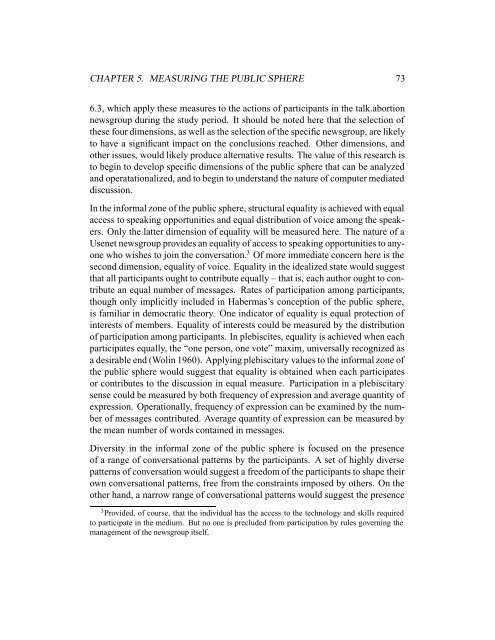Expanding the Public Sphere through Computer ... - ResearchGate
Expanding the Public Sphere through Computer ... - ResearchGate
Expanding the Public Sphere through Computer ... - ResearchGate
You also want an ePaper? Increase the reach of your titles
YUMPU automatically turns print PDFs into web optimized ePapers that Google loves.
CHAPTER 5. MEASURING THE PUBLIC SPHERE 73<br />
6.3, which apply <strong>the</strong>se measures to <strong>the</strong> actions of participants in <strong>the</strong> talk.abortion<br />
newsgroup during <strong>the</strong> study period. It should be noted here that <strong>the</strong> selection of<br />
<strong>the</strong>se four dimensions, as well as <strong>the</strong> selection of <strong>the</strong> specific newsgroup, are likely<br />
to have a significant impact on <strong>the</strong> conclusions reached. O<strong>the</strong>r dimensions, and<br />
o<strong>the</strong>r issues, would likely produce alternative results. The value of this research is<br />
to begin to develop specific dimensions of <strong>the</strong> public sphere that can be analyzed<br />
and operatationalized, and to begin to understand <strong>the</strong> nature of computer mediated<br />
discussion.<br />
In <strong>the</strong> informal zone of <strong>the</strong> public sphere, structural equality is achieved with equal<br />
access to speaking opportunities and equal distribution of voice among <strong>the</strong> speakers.<br />
Only <strong>the</strong> latter dimension of equality will be measured here. The nature of a<br />
Usenet newsgroup provides an equality of access to speaking opportunities to anyone<br />
who wishes to join <strong>the</strong> conversation. 3 Of more immediate concern here is <strong>the</strong><br />
second dimension, equality of voice. Equality in <strong>the</strong> idealized state would suggest<br />
that all participants ought to contribute equally – that is, each author ought to contribute<br />
an equal number of messages. Rates of participation among participants,<br />
though only implicitly included in Habermas’s conception of <strong>the</strong> public sphere,<br />
is familiar in democratic <strong>the</strong>ory. One indicator of equality is equal protection of<br />
interests of members. Equality of interests could be measured by <strong>the</strong> distribution<br />
of participation among participants. In plebiscites, equality is achieved when each<br />
participates equally, <strong>the</strong> “one person, one vote” maxim, universally recognized as<br />
a desirable end (Wolin 1960). Applying plebiscitary values to <strong>the</strong> informal zone of<br />
<strong>the</strong> public sphere would suggest that equality is obtained when each participates<br />
or contributes to <strong>the</strong> discussion in equal measure. Participation in a plebiscitary<br />
sense could be measured by both frequency of expression and average quantity of<br />
expression. Operationally, frequency of expression can be examined by <strong>the</strong> number<br />
of messages contributed. Average quantity of expression can be measured by<br />
<strong>the</strong> mean number of words contained in messages.<br />
Diversity in <strong>the</strong> informal zone of <strong>the</strong> public sphere is focused on <strong>the</strong> presence<br />
of a range of conversational patterns by <strong>the</strong> participants. A set of highly diverse<br />
patterns of conversation would suggest a freedom of <strong>the</strong> participants to shape <strong>the</strong>ir<br />
own conversational patterns, free from <strong>the</strong> constraints imposed by o<strong>the</strong>rs. On <strong>the</strong><br />
o<strong>the</strong>r hand, a narrow range of conversational patterns would suggest <strong>the</strong> presence<br />
3 Provided, of course, that <strong>the</strong> individual has <strong>the</strong> access to <strong>the</strong> technology and skills required<br />
to participate in <strong>the</strong> medium. But no one is precluded from participation by rules governing <strong>the</strong><br />
management of <strong>the</strong> newsgroup itself.
















